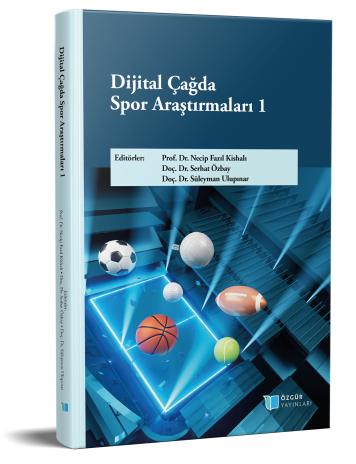
Sports Research in the Digital Age I
Synopsis
Dear readers, today we are here with a book on the subject of "Digital Technology and Sports Relations". Today, the effects of digital technology on sports fields are very important and diverse. In this book, we will present how digital technology is integrated with technology to valuable titles and contents that we will encounter in all areas of sports. This book, which we brought together with its readers, was created with scientific concerns and original sources of literature. The opening chapter of our book was created through artificial intelligence. This is one of the highlights of our book in terms of seeing how far the reference sources of scientists can go in the future and how artificial intelligence literacy will gain a very important phenomenon and value.
In addition, in terms of the articles published in our book, our book is a first in terms of two universities in Erzurum coming together for a common purpose.
Especially if we look at the article titles written by valuable authors for each section of our book, Digital Technology and Sports Education Programmes are included in the section written by Dr. Fatih Alaeddinoğlu, Dr. Haluk Sivrikaya and Assoc. Prof. Vahdet Alaeddinoğlu. In the article written by Dr Buğra Çağatay Savaş, the other section author, how to develop the phenomenon of sports with the title of Digital Marketing and Sports Sponsorship is covered. In another section, Dr Hasan Hüseyin Yılmaz conducted an interesting research on Performance Monitoring during Training and Competition. Again, our researchers Dr. Cebrail Gençoğlu and Dr. Selim Asan signed one of the most enjoyable and one of the biggest research topics in the future with the title of Sports Nutrition and Artificial Intelligence in the Digital Age. Another interesting topic was the topic of Dr. Muhammet Mavibaş. International Sports Organisations and the Effects of Digital Technology Usage has done a successful study on presenting the opportunities offered by technology to the audience at today's greatest impact level. Finally, Dr Gökhan Atasever has carried out an impressive study on Performance Tests and Technology by presenting the tools and technological applications that athletes are followed in a scientific sense.
In this context, with which concepts sport will be positioned in the future and what opportunities digital technologies will offer to sportsmen, spectators and managers are closely related to how technology is perceived by sports scientists. In particular, it is one of the focal points of sports science to reveal how a phenomenon that learns from human beings and develops depending on human beings interacts with an entity that has human beings at its centre and is constantly changing, and to determine its boundaries. In this context, we can understand the answers to the question of how the concept of digital technology and sports interact with each other from the following concept headings.
These Concept Headings;
- Sport Effects of Digital Technology:
Data Analysis and Performance Improvement: Thanks to sensors, wearable devices and software used for tracking and analysing athletes, coaches and athletes can work in a more focused and targeted manner. For example, GPS trackers make it possible to monitor athletes' movements and assess their fatigue levels.
Spectator Experience: Digital technology has transformed the sports viewing experience. Technologies such as virtual reality (VR) and augmented reality (AR) offer the opportunity to watch practical matches from a different perspective. In addition, thanks to social media platforms, fans can establish a closer relationship with their teams and receive instant information about matches.
- E-Sports and Digital Technology:
Rising Trend: E-Sports: E-Sports is one of the reflections of digital technology in the field of sports. This field, which can be set as professional-level competitions of competitive video games, is rapidly increasing its popularity among players. E-Sports events are reaching large audiences and generating large prize pools.
Live Streaming and Accessibility: E-Sports events are broadcast live on online platforms, reaching viewers of all ages. Thanks to digital platforms, anyone can access these events from anywhere, which increases presentations.
- Digital Technology and Innovation:
Sport Education and Simulations: Digital technology is used in sports training. Thanks to virtual simulations, athletes can improve their ability to train and participate in various scenarios without taking risks.
Innovative Sports Equipment: Innovations such as 3D printing technology have transformed into the design and production of sports equipment. In this way, it has become possible to change lighter, durable and personalised.
- Ethical and Security Issues:
Data Privacy and Security: Wearable devices and apps collect users' personal health and mobility data. How this is industrialised and protected is an important issue in terms of data privacy and security.
Technology in Anti-Doping: Digital technology can cause both positive and negative effects in the fight against doping. Just as there is a risk of developing new doping methods, it is also possible that these technologies could be used for doping control.
Conclusion:
The relationship between digital technology and sport has transformed the decomposition of the sporting world. Data analysis, e-sports, technological effects in advanced fields are seen. However, this relationship also brings with it ethical and security policies. The important thing is to stick to ethical and safety policies for the development and popularisation of daily sport.
In this book, it tries to address the issue of "Digital Technology and Sports Relations" in general terms. We hope that we have been able to provide enjoyable reading and useful information to sports science and the sports world.

